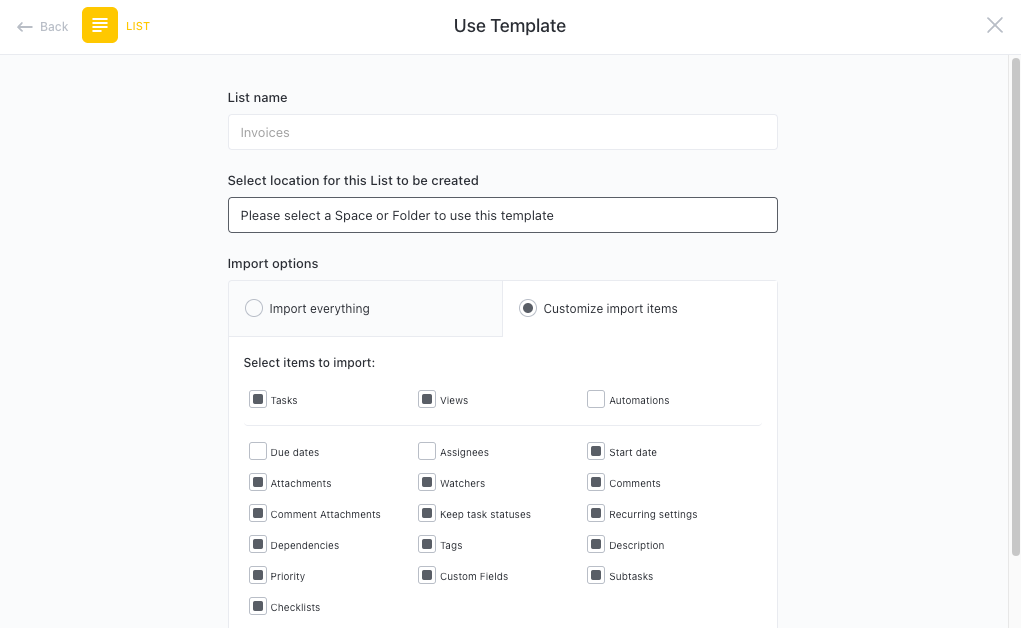Managing credit control can be a daunting task, especially when you're juggling multiple clients and invoices. But fear not, because ClickUp's Credit Control SOP Template is here to save the day!
With this template, you can streamline your credit control process and ensure timely payments, so that your business stays financially healthy. Here's how it helps:
- Standardizes your credit control procedures for consistency and efficiency
- Automates reminders and notifications to stay on top of overdue payments
- Tracks payment history and customer creditworthiness for better decision-making
Say goodbye to late payments and hello to a well-managed credit control system. Get started with ClickUp's Credit Control SOP Template today and take control of your cash flow!
Benefits of Credit Control SOP Template
When it comes to managing credit control, having a standardized process is crucial. The Credit Control SOP Template offers a range of benefits to help streamline your credit control procedures:
- Ensures consistency and accuracy in credit control practices
- Provides a clear step-by-step guide for credit control tasks
- Helps reduce the risk of late payments and bad debts
- Improves cash flow by optimizing credit control procedures
- Enhances communication and collaboration between departments
- Increases efficiency and productivity in credit control operations
- Enables better tracking and monitoring of credit control activities
- Facilitates compliance with regulatory requirements and industry standards
Main Elements of Credit Control SOP Template
ClickUp's Credit Control SOP Template is designed to help you streamline and standardize your credit control processes.
This Doc template contains all the necessary sections and content to create a comprehensive Standard Operating Procedure (SOP) for credit control. It also includes ClickUp features such as:
- Custom Statuses: Customize the statuses to reflect the different stages of your credit control process, such as “Pending Review,“ “In Progress,“ and “Completed.“
- Custom Fields: Add custom fields to categorize and track important information related to credit control, such as customer details, outstanding balances, and payment history.
- Custom Views: Utilize different views, such as List view to manage tasks, Calendar view to track deadlines, and Table view to analyze data and metrics.
- Project Management: Enhance your credit control process with Automations, Integrations, and Dashboards to automate repetitive tasks, integrate with other tools, and gain real-time insights into your credit control performance.
How to Use SOP for Credit Control
When it comes to managing credit control efficiently, having a clear Standard Operating Procedure (SOP) is essential. Follow these steps to effectively use the Credit Control SOP Template in ClickUp:
1. Understand the purpose
Before diving into the template, it's important to understand the purpose of credit control. Familiarize yourself with the concept of credit control and how it impacts your business. This will help you tailor the SOP template to your specific needs.
Use a Doc in ClickUp to research and gather information about credit control and its importance.
2. Customize the template
Once you have a good understanding of credit control, it's time to customize the SOP template to fit your business requirements. Review each section of the template and make necessary changes to ensure it aligns with your company's policies and procedures.
Use the Docs feature in ClickUp to easily edit and customize the Credit Control SOP Template.
3. Define credit policies
Clearly define your credit policies within the SOP template. This includes establishing credit limits, payment terms, and procedures for assessing creditworthiness. Be sure to include any specific requirements or criteria that need to be met before extending credit to customers.
Utilize custom fields in ClickUp to define and track credit policies for each customer.
4. Document credit control procedures
Outline step-by-step procedures for managing credit control in your business. This may include processes for credit checks, invoicing, payment reminders, debt collection, and dispute resolution. Be thorough in documenting each procedure to ensure consistency and efficiency.
Create tasks in ClickUp to outline and assign responsibilities for each step of the credit control process.
5. Implement and train
Once the SOP template is customized and procedures are documented, it's time to implement and train your team. Share the SOP with relevant team members and provide training on how to follow the credit control procedures outlined in the document.
Use Automations in ClickUp to streamline the implementation process and ensure tasks are assigned to the appropriate team members.
6. Monitor and improve
Regularly monitor the effectiveness of your credit control procedures and make improvements as needed. Assess key metrics such as average days sales outstanding (DSO), bad debt ratio, and customer payment trends. Use this data to identify areas for improvement and refine your credit control processes.
Utilize Dashboards in ClickUp to track and analyze credit control metrics and make data-driven decisions for improvement.
By following these steps and utilizing the Credit Control SOP Template in ClickUp, you can establish effective credit control practices that help maintain healthy cash flow and minimize financial risks for your business.

Get Started with ClickUp's Credit Control SOP Template
Credit control teams can use this Credit Control SOP Template to streamline and standardize their credit control processes.
First, hit “Add Template“ to sign up for ClickUp and add the template to your Workspace. Make sure you designate which Space or location in your Workspace you'd like this template applied.
Next, invite relevant members or guests to your Workspace to start collaborating.
Now you can take advantage of the full potential of this template to improve credit control:
- Create a Checklist for each step of the credit control process, including credit assessment, invoicing, and debt collection
- Assign these tasks to team members and set due dates to maintain accountability
- Utilize the Table view to see an overview of all outstanding invoices and their statuses
- Set up recurring tasks to ensure regular credit reviews are conducted
- Use Automations to send reminders to customers about upcoming payment due dates
- Collaborate using Comments to communicate with team members and customers regarding specific invoices
- Analyze the Workload view to balance the workload and allocate resources effectively
- Monitor and analyze tasks to identify bottlenecks and improve efficiency.










